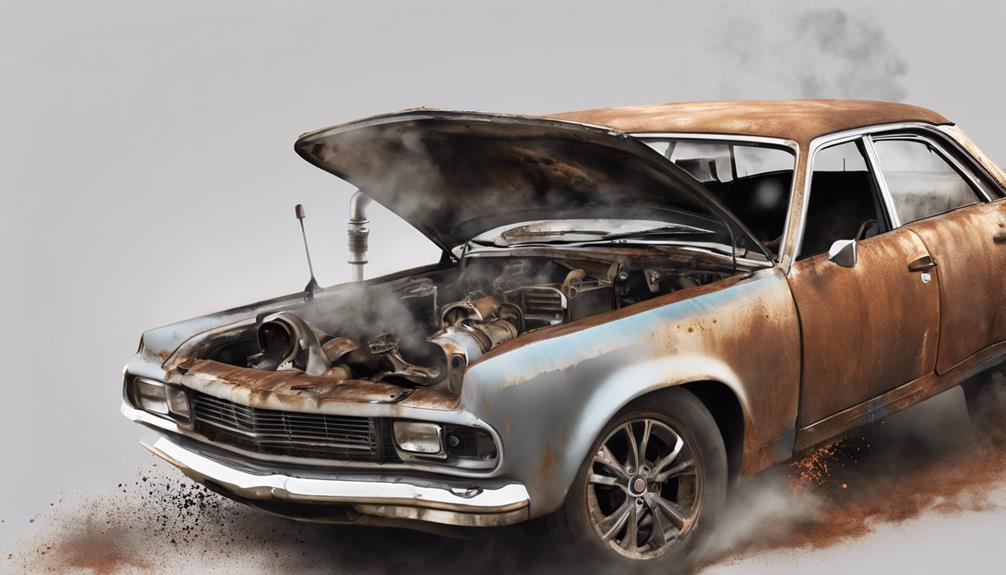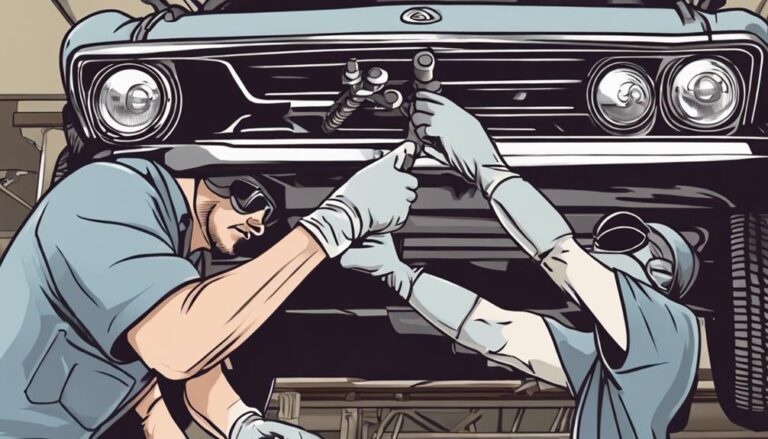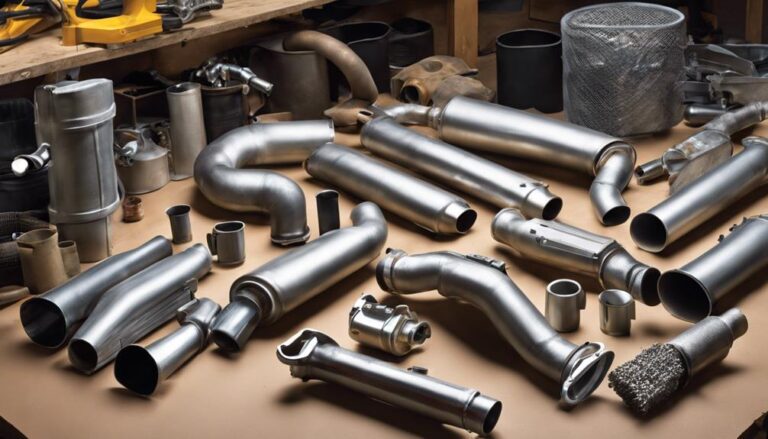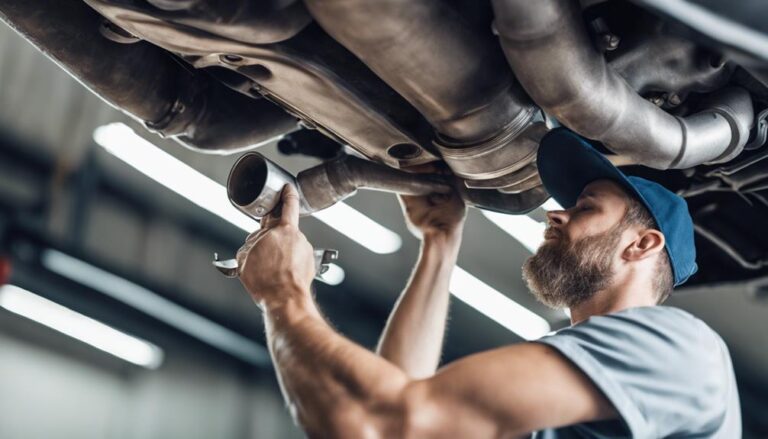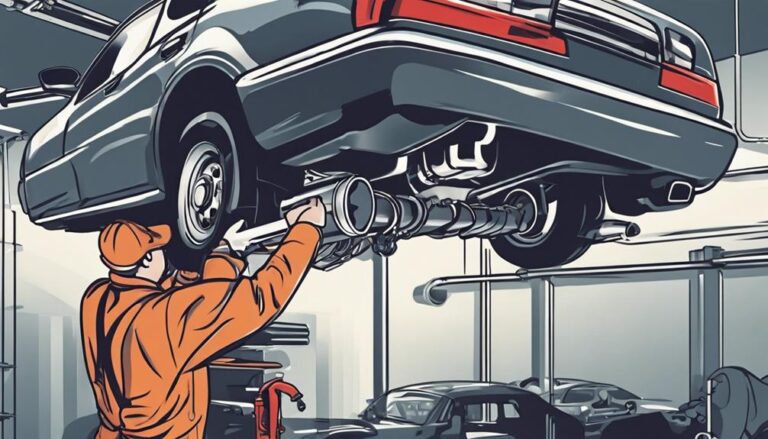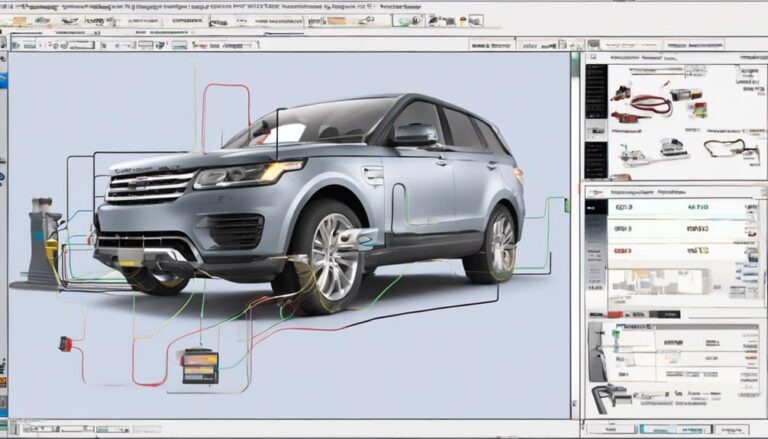Understanding 5 Common Exhaust System Issues
If you've ever noticed a sudden decrease in fuel efficiency and engine performance, your vehicle might be experiencing a faulty oxygen sensor. This issue, although seemingly minor at first, can have significant repercussions on your car's overall functionality.
Understanding how to identify and address common exhaust system issues can not only save you money in the long run but also ensure your safety on the road.
Stay tuned to uncover practical tips on how to tackle these issues effectively and keep your vehicle running smoothly.
Key Takeaways
- Prompt professional attention is crucial for diagnosing and addressing exhaust system issues effectively.
- Regular maintenance and inspections can prevent costly repairs and ensure optimal system performance.
- Immediate action on exhaust leaks, broken hangers, and smoke analysis is essential for longevity.
- Understanding common problems like faulty sensors and rust prevention aids in maintaining a healthy exhaust system.
Faulty Oxygen Sensor
If you notice decreased fuel efficiency or engine misfires, a faulty oxygen sensor could be the culprit, potentially leading to overheating or catalytic converter damage. To diagnose a faulty oxygen sensor, mechanics often use diagnostic tools to read error codes from the vehicle's onboard computer. These codes provide insights into which sensor may be malfunctioning.
Once identified, the replacement process involves locating the sensor, typically mounted on the exhaust system, and disconnecting the electrical connector. Specialized tools may be required to remove the sensor, as it can sometimes be tightly secured due to heat and corrosion. Care must be taken during installation to ensure the new sensor is correctly positioned and tightened to prevent leaks or further issues.
Professional assistance is recommended for this task to guarantee proper diagnosis and replacement, ultimately restoring optimal engine performance. Regular maintenance checks are crucial to catch sensor issues early and prevent more severe complications down the road.
Exhaust Leaks
Exhaust leaks, commonly found in components such as the exhaust manifold, catalytic converter, muffler, and exhaust pipes, present critical issues that demand immediate attention to maintain optimal exhaust system performance and prevent safety hazards. Identifying the sources of these leaks is vital for effective repair. Below is a table outlining common sources of exhaust leaks and repair techniques:
| Sources of Exhaust Leaks | Repair Techniques |
|---|---|
| Exhaust Manifold | Inspect for cracks or loose bolts. Replace gasket if damaged. Use sealant for minor leaks. |
| Catalytic Converter | Check for physical damage or rust. Welding or replacement may be necessary. |
| Muffler | Look for holes or corrosion. Patch small holes with repair tape or replace the muffler. |
| Exhaust Pipes | Inspect for holes, rust, or loose connections. Use clamps or welding to fix leaks. |
| Gaskets | Check for wear and tear. Replace with new gaskets to ensure a proper seal. |
Promptly addressing these leaks using the appropriate repair techniques is essential to ensure the longevity and efficiency of your vehicle's exhaust system.
Exhaust Smoke

When observing your vehicle's emissions, different colors of smoke can indicate various engine issues that require prompt attention from a professional to prevent further damage.
Blue smoke points to oil burning in the combustion chamber, often caused by worn piston rings or valve seals.
Black smoke suggests excess fuel burning, commonly due to issues like a clogged air filter or faulty fuel injectors.
White or gray smoke may indicate coolant burning, signaling a potential leak in the head gasket or a cracked cylinder head.
Regardless of the color, any smoke from your exhaust should be investigated promptly to avoid additional engine damage. Engine diagnostics play a crucial role in identifying the root cause of the smoke color, guiding the necessary repairs.
To maintain your vehicle's health, regular maintenance checks are essential. If you notice unusual exhaust smoke, seek professional help for thorough engine diagnostics and follow maintenance tips provided to keep your vehicle in optimal condition.
Rust
Exposure to snow, rain, and salt accelerates the formation of rust in your vehicle's exhaust system, leading to potential issues such as holes and corrosion that can compromise its functionality. Preventive maintenance is crucial to combat rust and ensure the longevity of your exhaust system.
Here are some key points to consider:
- Regular washing of the vehicle undercarriage helps prevent rust formation in the exhaust system.
- Rust can cause structural damage from the inside out, affecting the overall performance of the exhaust system.
- Clearing debris from the undercarriage is crucial to avoid corrosion and maintain the integrity of the exhaust system.
- Inspecting the exhaust system for any signs of rust or corrosion can help in early detection and prevention of further damage.
- Applying corrosion prevention products or coatings to vulnerable areas of the exhaust system can significantly extend its lifespan and performance.
Broken Hangers
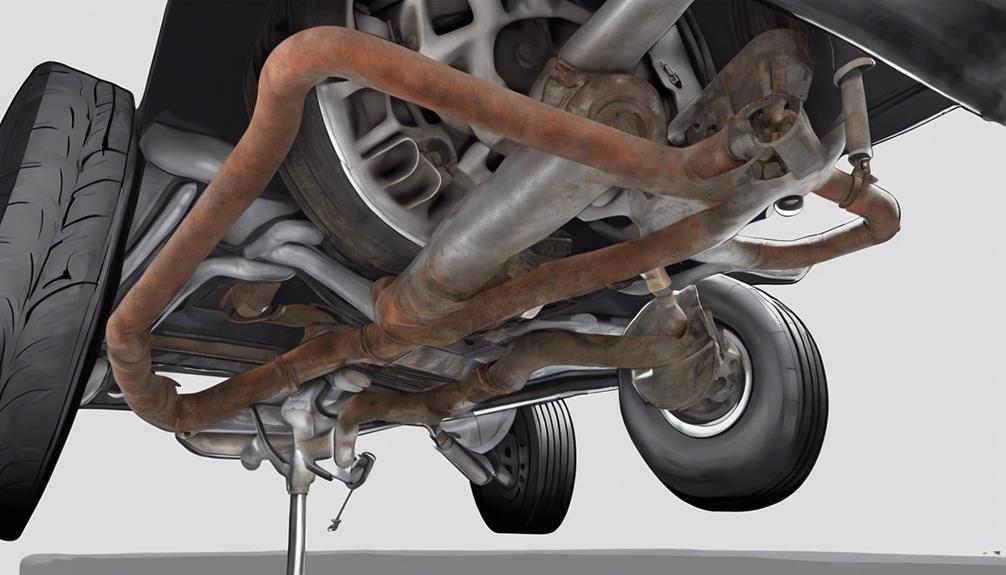
Inspecting the hangers regularly is essential to ensure their integrity and functionality in protecting the exhaust system components while driving. Broken hangers can compromise the stability of the exhaust system, leading to potential damage.
When hangers break, they fail to support the exhaust system properly, causing excessive movement that can result in dents, cracks, or even detachment of components. This movement can also place undue stress on other parts of the exhaust system, exacerbating the issue.
To prevent such problems, it's crucial to address broken hangers promptly through preventive maintenance. Repair options for broken hangers typically involve either replacing the damaged hanger with a new one or repairing the existing hanger if feasible.
Frequently Asked Questions
What Is the Most Common Problem of Exhaust System?
Exhaust leaks are the most common issue in exhaust systems, often caused by rust damage and leaking joints. Address them promptly to prevent further damage. Inspect, seal, or replace affected components for optimal performance.
What Is the Most Common Cause of Failure on the Exhaust System?
To prevent common exhaust system failures, prioritize regular maintenance. Inspect for rust, corrosion, and holes. Address any signs promptly. Professionals can diagnose and fix issues effectively. Remember, maintenance is key to preserving the integrity of your exhaust system.
What Exhaust System Problem Is Most Likely to Cause Performance Issues?
Feeling frustrated by sluggish acceleration and reduced power? A clogged catalytic converter might be to blame! Addressing this issue promptly is crucial. Consider professional inspection and replacement to restore optimal engine performance.
What Is One of the Most Obvious Signs of a Problem With Your Exhaust System?
If you hear strange noises or see significant smoke coming from your vehicle's undercarriage, it's a clear sign of a potential exhaust system issue. Addressing these signs promptly can prevent further damage and maintain your vehicle's performance.
Conclusion
Now that you understand the 5 common exhaust system issues, it's time to take action and ensure your vehicle's health.
Just like a vigilant guardian protecting a precious treasure, regular inspection and prompt addressing of problems are crucial to avoid potential dangers.
Remember, a well-maintained exhaust system is the key to optimal vehicle performance and safety on the road.
Stay proactive and keep your vehicle running smoothly like a well-oiled machine!

